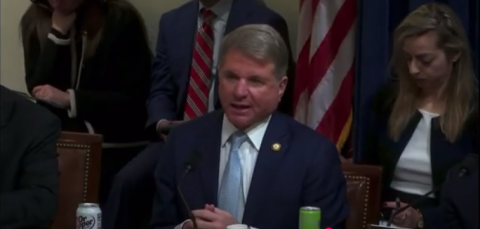McCaul Discusses The State of America's Cyber Workforce at Homeland Security Committee Hearing
WASHINGTON – This week, U.S. Congressman Michael McCaul (R-Texas) — chairman emeritus and current vice chairman of the House Homeland Security Committee — delivered remarks and questioned witnesses regarding the state of the American cybersecurity workforce and the need for skilled cyber professionals capable of thwarting evolving global threats in cyberspace. He addressed his questions to Dr. David Russomanno, executive vice president of academic affairs and provost at the University of Memphis; and Max Stier, president and chief executive officer at the Partnership for Public Service.

Remarks as delivered:
McCaul: Thank you, Mr. Chairman ... In 2014, the ranking member and I introduced [legislation to strengthen and expand] the CyberCorps Scholarship for Service program. Since that time, we have had $600 million in funding, 5,000 scholarships, three- to four-year work requirements. First of all, Dr. Russomanno ... and Mr. Stier, could you touch on the success of the program and what needs to be done to enhance it? In addition, how will the PIVOTT Act complement those efforts?
Russomanno: Well, thank you, Congressman McCaul, for that question.
As I said in my opening remarks, I have had the opportunity to be part of CyberCorps at two different universities and have seen the impact. Both universities were urban-serving ... serving students from a variety of backgrounds.
One of the real strengths of CyberCorps is the internship component — the career fairs. The national career affairs in D.C. are a wonderful opportunity for students to network, [and] to learn more about the various federal agencies where cybersecurity is, of course, a very important aspect. And so that internship opportunity has really been important.
Now, in terms of improving that, I think more distribution of those types of affairs across the nation would be critically important. If you look at urban-serving universities, many times students may be reluctant to leave their immediate geographic area. There could be family dependencies and so on [for] that first-generation student. So I think having opportunities distributed throughout the nation — many of those jobs are concentrated in the D.C. area, — I believe that would be a great opportunity, and maybe working additionally with the private sector with regard to incentives to provide further distribution and penetration across the U.S. We heard about rural-serving areas as well, so I think that could be an opportunity to further penetrate the great benefits of CyberCorps across our nation.
McCaul: And Mr. Stier?
Stier: Well, first of all, thank you for creating the program. It has done a lot of good. And thank you for looking at how to make it better because we, obviously, [need] that always.
My thought would be to really think about career pathing. I think one of the real challenges is you may get entry talent coming in, but how do you retain them? Can you create something that might be an add-on to the program that provides a private sector placement so that they are getting both a private sector and the public sector experience with the expectation that they will take that private sector experience and return to the government as a way of, again, bringing best practice from the private sector into the government? We need to see more of that flow back and forth, as I mentioned earlier. And I think if you think of this as a longer-term pathway, that will be very important.
And then the last thing I would say to your back point — I think the PIVOTT Act is an improvement. We need to scale. We are talking about such a huge problem. If we don't scale, you know, it's a good thing, but it's not meeting the need.
McCaul: Yes. I think marking up and passing the PIVOTT Act will help, I think, complement the success of the CyberCorps program.
The role of the [National Guard] ... I visit my guardsman at Camp Mabry in Austin. And, you know, they have tech jobs in the daytime and they are weekend warriors in the Cyber Command, you know, on the weekends. I see that as a great enhancement to our both federal workforce but also with the state as well. My governor just created a Texas Cyber Command in San Antonio, where the Air Force has its Cyber [base]. And I see that federal-state partnership really enhancing that. I think it's very helpful when the states get engaged in this and not just relying on the federal government. Do you have any thoughts on that?
Russomanno: I would say once again CyberCorps and the PIVOTT Act with that service component is a great model. The question is: How do other entities adopt that model? And, certainly, I think there's ample opportunity at the state and local levels to look at how the CyberCorps project has been successful and, in turn, then adopt those best practices in their local areas as well as the private sector.
McCaul: I think, Mr. Russomanno, you mentioned the role of veterans, too. I mean they have a skill set that they may not be aware [of, and] the private sector or state or federal service could, you know, enhance their careers beyond the military, and I think that's an area we need to enhance and look at as well.
And then, finally, on the exemption issue, I just want to close by saying that it's my understanding that CISA and the DoD are exempted from the executive order, so for your student who may be worried about this, that's good for them to know — also the national security and public safety exemption to the executive order as well.
And with that, I yield back.
###